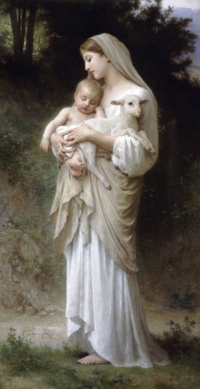Innocence
From The Art and Popular Culture Encyclopedia
| Revision as of 08:05, 7 April 2008 Jahsonic (Talk | contribs) (→See also) ← Previous diff |
Revision as of 20:21, 12 September 2012 Jahsonic (Talk | contribs) Next diff → |
||
| Line 1: | Line 1: | ||
| - | [[Image:Bouguereau Innocence.jpg|thumb|200px|[[Innocence]] ([[1893]]) by [[William-Adolphe Bouguereau]]: Both young [[children]] and [[lamb]]s are symbols of innocence]] | + | [[Image:Bouguereau Innocence.jpg|thumb|200px|''[[Innocence (Bouguereau)|Innocence]]'' ([[1893]]) by [[William-Adolphe Bouguereau]]: Both young [[children]] and [[lamb]]s are [[symbol]]s of [[innocence]]]] |
| {{Template}} | {{Template}} | ||
| # [[absence|Absence]] of [[responsibility]] for a [[crime]]. | # [[absence|Absence]] of [[responsibility]] for a [[crime]]. | ||
Revision as of 20:21, 12 September 2012
|
Related e |
|
Featured: |
- Absence of responsibility for a crime.
- Her attorney managed to convince the jury of her innocence.
- Lack of understanding about sensitive subjects such as sexuality and crime.
- In his innocence, he offered the stranger to bring the package to Paris, never suspecting it contained drugs.
- Lack of ability or intention to harm or damage.
- Tests have demonstrated the innocence of this substance.
Innocence is a term that describes the lack of guilt of an individual, with respect to a crime. It may also be used to indicate a general lack of guilt, with respect to any kind of crime, sin, or wrongdoing.
It can also refer to a state of unknowing, where one's experience is lesser, in either a relative view to social peers, or by an absolute comparison to a more common normative scale. In contrast to ignorance, it is generally viewed as a positive term, connoting a blissfully positive view of the world, in particular one where the lack of knowledge stems from a lack of wrongdoing, whereas greater knowledge comes from doing wrong. This connotation may be connected with a popular false etymology explaining "innocent" as meaning "not knowing" (Latin noscere).
People who lack the mental capacity to understand the nature of their acts may be regarded as innocent regardless of their behavior. From this meaning comes the term innocent to refer to a child under the age of reason, or a person, of any age, who is severely mentally disabled.
In some cases, the term of "innocence" connotes a pejorative meaning, where an assumed level of experience dictates common discourse or baseline qualifications for entry into another, different, social experience. Since experience is the prime factor in determining a person's point of view, innocence is often also used to imply an ignorance or lack of personal experience.
See also
- Good and evil
- Noble savage
- Primitive
- Innocent
- Nice
- Innocuous
- The Innocents
- Ingenue (stock character)


